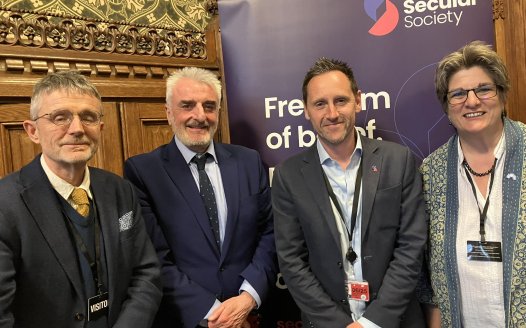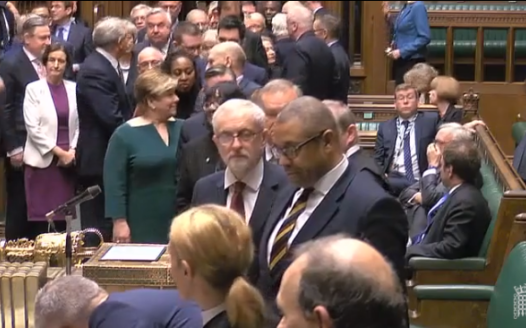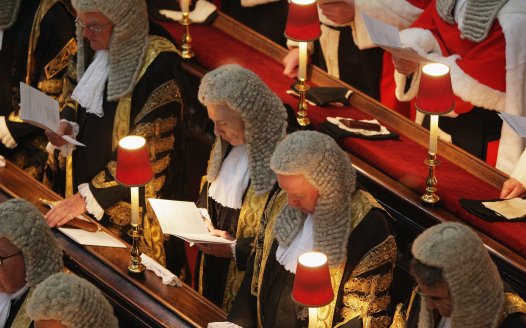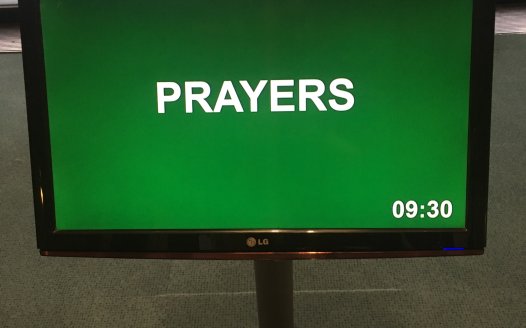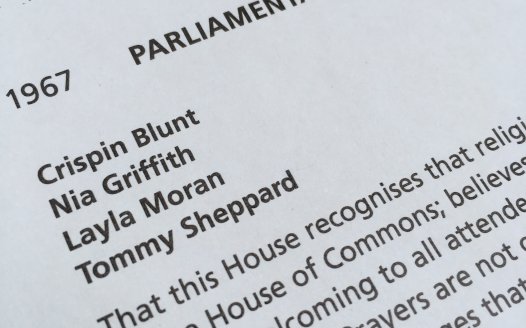The great debate begins
Posted: Fri, 17th Feb 2012 by Terry Sanderson
We've been trying for a long time to get a national debate going about the place of religion in British society. It took our court case in Bideford to really ignite it.
The initial reaction has been — as we predicted last week — hysterical, misinformed, biased, unbalanced and in some instances downright dishonest. It's been frustrating to see the concept of secularism misrepresented as something sinister and threatening – sometimes through simple ignorance, but more often deliberately by people who see their privileges threatened.
But as the week has worn on, we have seen a more considered response beginning to emerge. A reaction to the reaction, you might say.
Lady Warsi's speech at the Vatican increased the volume of rhetoric that had followed our High Court victory on Council prayers at Bideford. But the Queen's intervention at Lambeth Palace— apparently a sort of coded and oblique nod in the direction of Lady Warsi — did not set the sirens howling in quite the same way. (I wrote about this on the Huffington Post blog)
We are gathering together many of the articles that give a more balanced view of the secularism debate in our "Media Round-up" feature at the NSS website. If you haven't already explored this reaction, I would certainly recommend you take some time to read the thoughts that are emerging on what secularism means, why secularisation is not the same thing and what both mean for British society.
Unfortunately, the extremity of negative media reaction when there is even a small questioning of religious privilege makes rational debate very difficult. All attempts to talk sensibly about the place of religion in a rapidly changing society result in an enormous chorus of bishops and religious pressure groups claiming "persecution" and "sidelining" and victimisation by "militant secularism".
In the Times on Thursday, Ruth Gledhill wrote a commentary in which she claims there is a war between religion and "new atheism". She said that the Church had become "militant" in reaction to the "atheist wars". She seems to be aiming her comments at Richard Dawkins who she said had "succeeded in uniting the faiths" against him.
We should focus on the background fear to this hysteria: the religious establishment is realising that it is fighting a rearguard action. Gledhill says that if the Church had been left alone it would probably have died of its own accord. Now it has arisen "like a lion".
Unfortunately for the Church, even a lion can succumb if it has no food.
In the Spectator this week, Lord Carey, the former Archbishop of Canterbury, actually suggested that Christians should be prepared to die for their faith in the "war against secularism". Such extremism from the former Church of England primate reveals the underlying panic.
The religious press is predictably flooded with a mixture of seething anger and triumphalism. For Baroness Warsi and the Queen each to attest to the importance that religion is to them is presumably a transparent attempt to give the impression that it is important to everyone else.
Richard Dawkins' comprehensive poll put paid to that hope. As we know from our lived experience, for a substantial majority of people in this country religion has no importance at all.
So it isn't really "militant secularism" that is threatening the Church (indeed, secularism probably represents its only hope of survival). It is a combination of the almost total indifference to its existence among the people of this country and sometimes revulsion at the callous disregard for other people's hopes and dreams: women shall not be part of the hierarchy; loving couples shall not be recognised if they are of the same sex; women shall have no control over their own reproduction if they are Catholic – and if it suits the church to cover up the crimes of its representatives, then a pious justification can be made to do it.
Secularism is simply a way of accepting the reality of modern Britain. The opinion poll from the Richard Dawkins Foundation showed widespread apathy to religion and a majority desire for it not to be involved in the making of public policy – even among many of those who ticked the "Christian" box in the latest Census.
This reality cannot be resisted for ever, and when the Queen makes the unconvincing case for the continuation of the establishment of the Church of England, we should remind her that her own son and heir doesn't agree with her. Prince Charles has vowed to change the Coronation Oath so that he will not promise to be defender of "the faith" but defender of (all) faith. So, the days of the monarchy's special relationship with Anglicanism are surely numbered.
Of course, we at the National Secular Society will continue to campaign for the Coronation Oath not to commit the monarch to any religious allegiance. That is because there is a substantial and growing minority of non-believers in this country, and they will not take kindly to being made second class citizens in the nation's constitutional life.
Unfortunately, it will be some time before the wider arguments about monarchy and a written constitution receive any serious consideration in politics. But when they reach the agenda, we will be there to lead the debate.
Terry Sanderson is President of the National Secular Society



